pifpaf
New member
The main buzz at Baselworld was of course HYT.
Launching a buzz successfully is like putting a spaceship into orbit, it takes a thruster, but it also takes an astronaut. Yet, most of time the buzz fails, because one of the elements is missing…
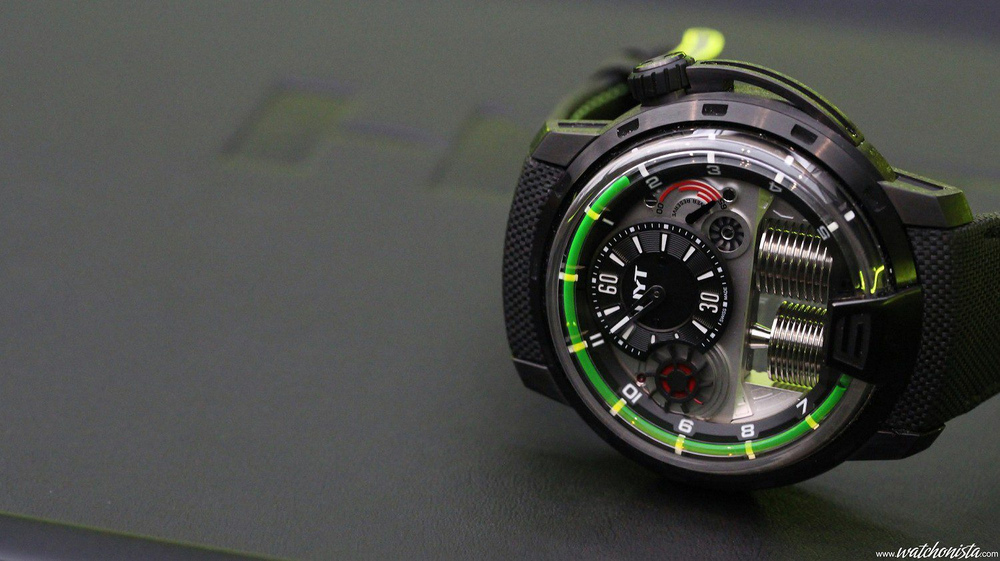
The pre-Basel marketing campaign was indeed very well orchestrated: a crew worthy of the A-team, a booth that would fit in Tron Uprising, a most of all, a set with a fancy fluorescent green decoration.
And above all, the engineer with a German accent, who explained how a machine, key to the success of the project, filled the capillaries of the watch. But which watch, by the way?
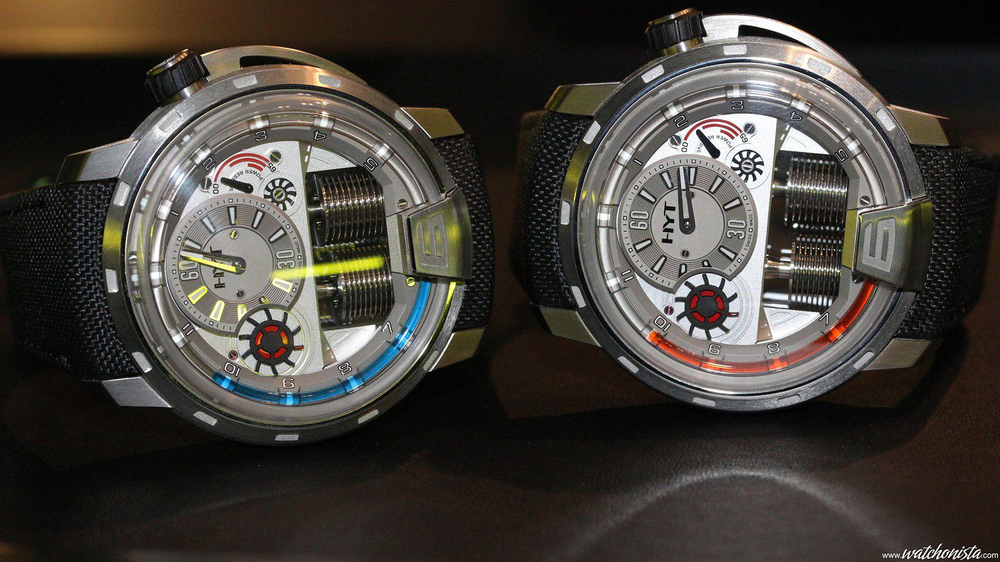
Regarding the general design, it makes us think of Darth Vader who would have borrowed Flash Gordon's watch.
The HYT H1 is a round watch of about 45mm (actually it is 48.8mm, but it seems far smaller when it sits on the wrist), available with a gold or a titanium case, topped by an impressive raised crystal.
It is rather the contrary of a classic watch, oscillating between sports and science-fiction;
The end result is indeed original and refreshes the round watch style, proof that it is still doable. The feature that makes this piece so special is the couple of rhodium coated pistons which push two fluids, one colorless and the other luminescent green, into capillarie. For that matter, these pistons and the feat they represent in terms of metallurgy are unfortunately outshined by the fluid display system; one would have wished them to be pushed to the forefront.
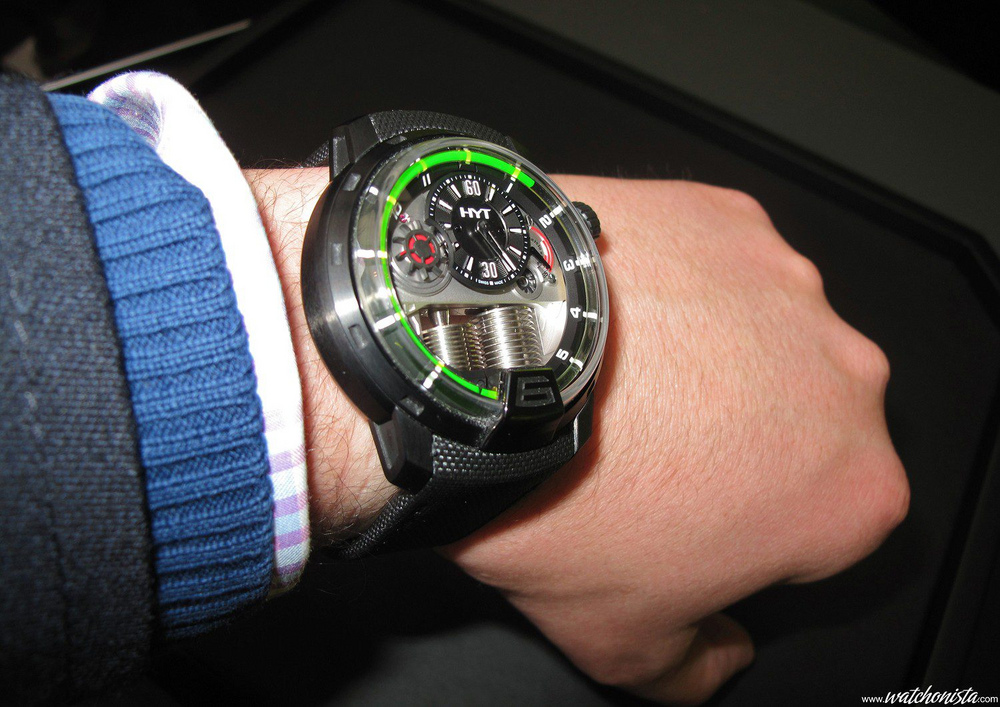
The luminescent liquid displays a retrograde hour between 7:15 and 5:45. The minutes are indicated on a sub-dial at 12 o'clock, while the power reserve sits at 3 o'clock and the operating indicator at 9 o'clock.
The indexes remind us a bit of some Zenith Defy Extreme from the Nataf period; they contrast in a somewhat anachronistic way with the caliber's magnificent classic finishes, a work performed by the Chronode workshop (located in the Jura led by Jean-François Mojon).
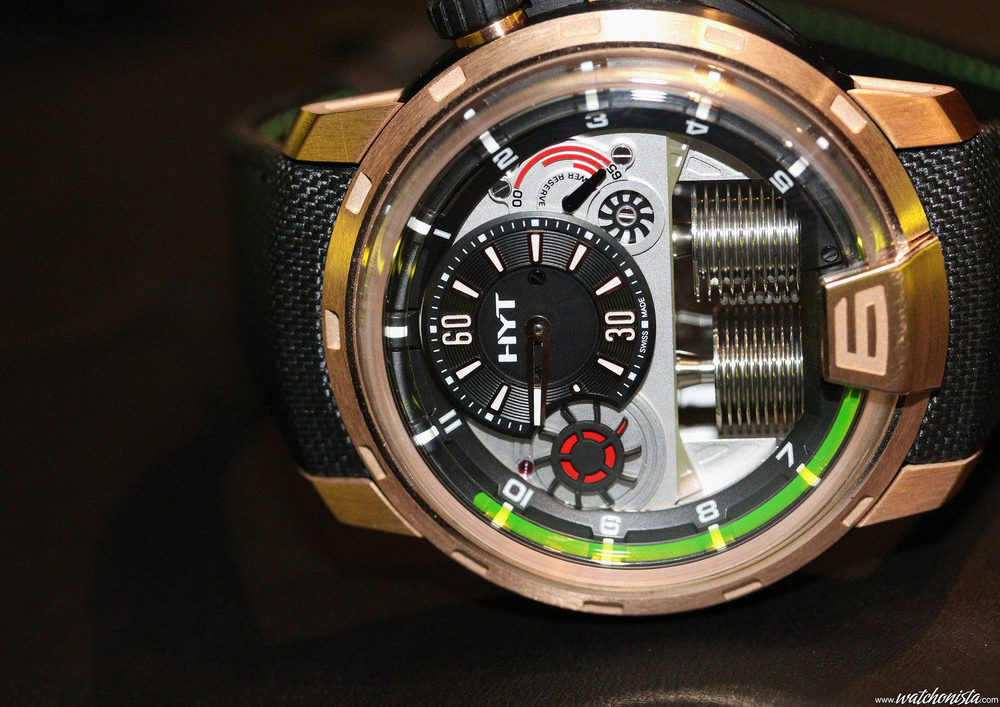
The way the device works is quite simple: the barrels (65-hour power-reserve - 28800v/h) drive the bellows, which move the fluids in the transparent tube.
The most impressive phase is of course when the retrograde indicator goes back to zero: in a few seconds, the transparent fluid pushes the colored one back to its start position.
The most playful amongst us will set the time a little more often than necessary, as this sequence is so impressive.
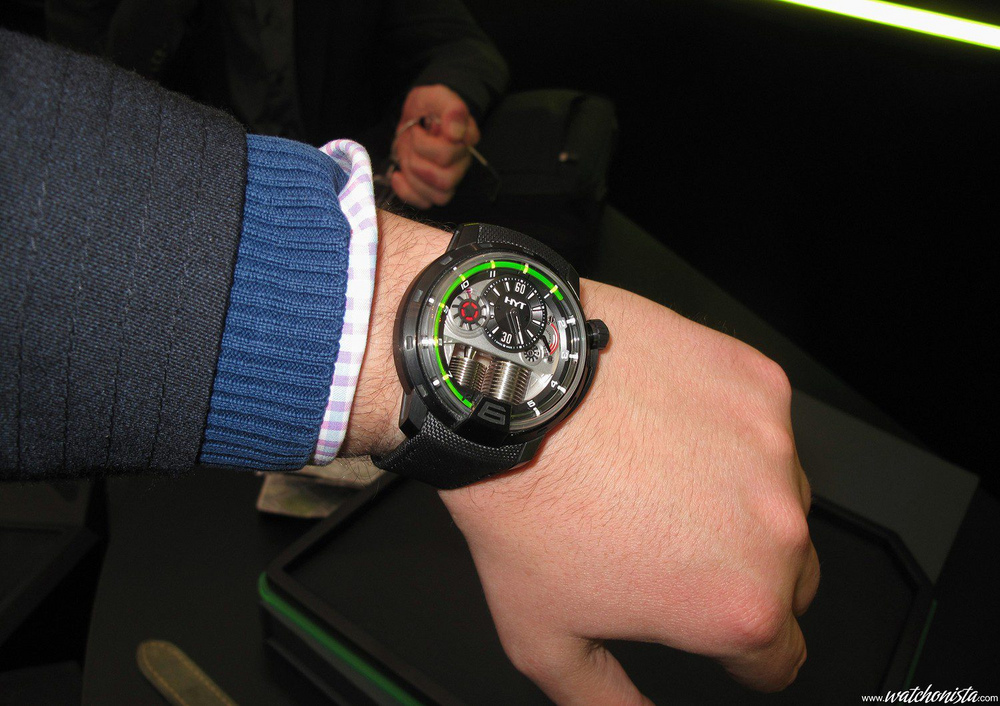
In terms of design, it is the opposite of the Opus 12: when the latter features a super-complex display, using 27 hands, the HYT could (and should!) almost content itself with its retrograde display; a sector dial with an aperture only for the display would have even more impact.
These two watches are the biggest hits of Baselworld 2012 (with the couple of Tudor)...
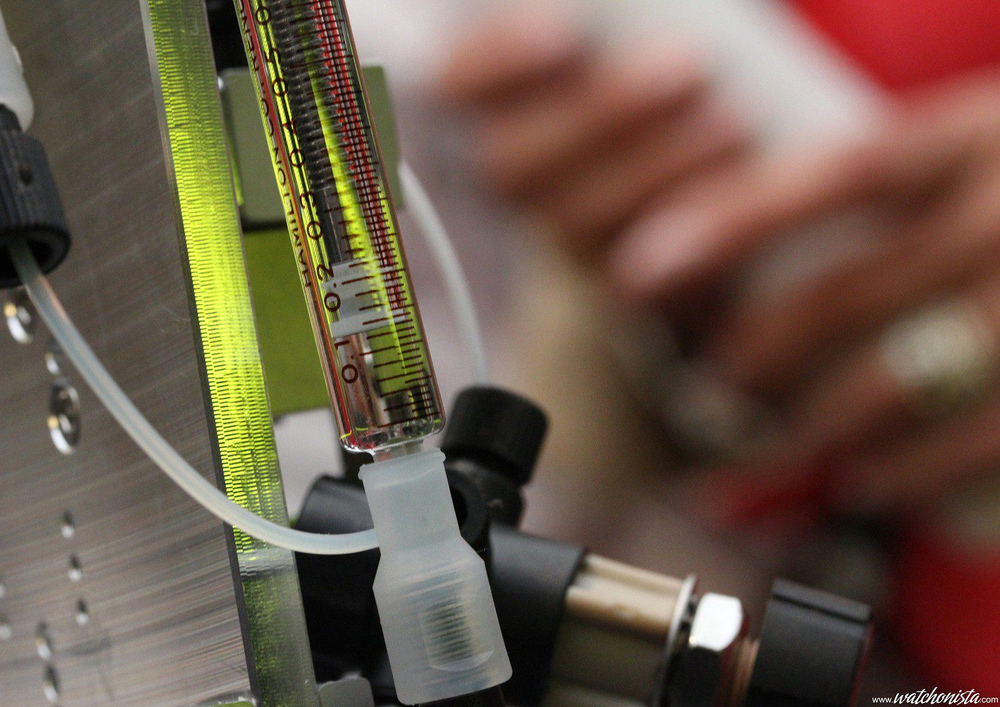
If the concept is very simple, as it is the case for any hydraulic technology, the development was a nightmare.
Starting with the watchmaker's psychological barrier of putting a liquid into a watchcase (when, for example, Rolex's core business is the waterproofing). For that matter, it is Preciflex, a company from Bienne, who helped develop a shockproof hydraulic microcircuit, through 7 patents filed by HYT.
Here are some photos of the machine which fills the HYT H1's hydraulic circuit:
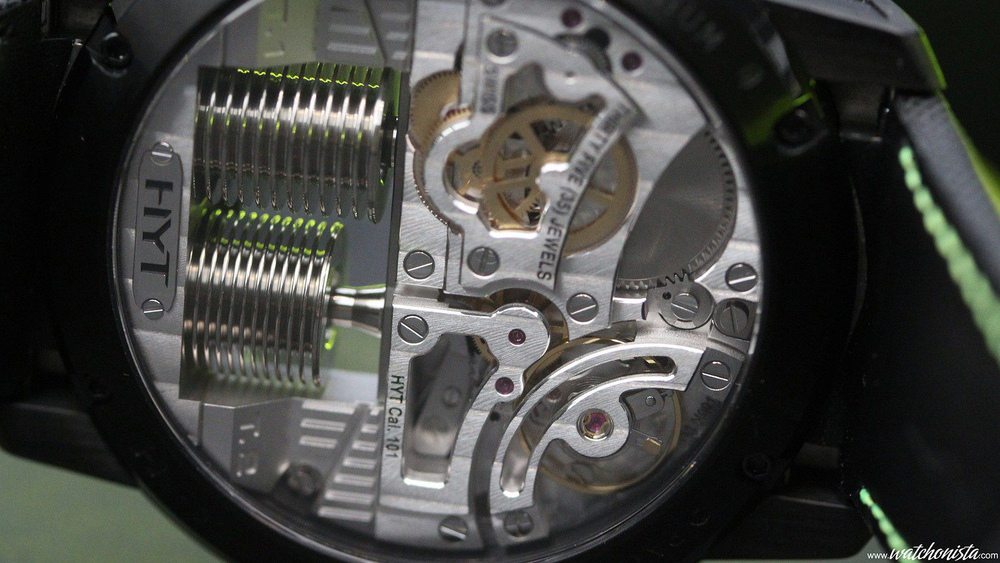
Let's be honest, even if the watch is a technological feat, it is also a show-off item: imagine your neighbors on a private beach in St Tropez, green (hydraulic) with envy because they don't own the new kick ass watch…
But the reason why it is such a success in the blogosphere is deeper than these limited views. You all know about the watch-lovers' taste for obsolete technologies?
At the bottom, HYT is a heaven-sent return to the pre-mechanical watchmaking.
Prior to the utilization of wheels, springs and chains, one relied on the flowing of water and its regularity to tell time, even without sunlight. The clepsydra is the mechanical regularity's oldest ancestor.
And even if, in the HYT H1, the liquid is only there for the display, the future developments in hydraulic power applied to watchmaking could give birth to completely new complications, and revive the watchmaking "Haut-Jurassic" era.
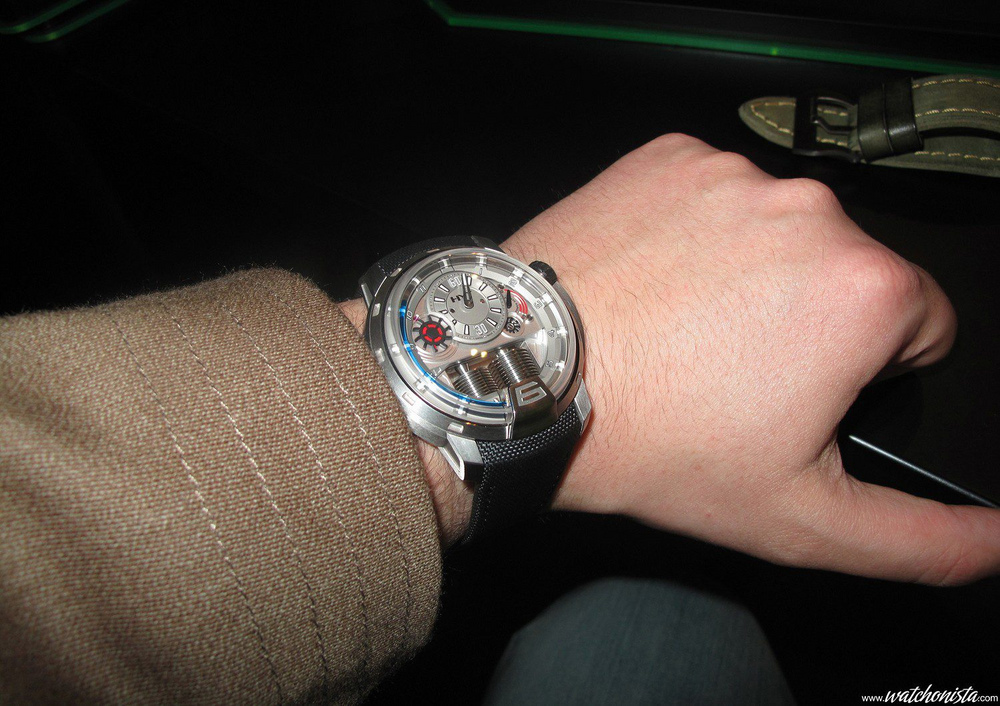
Beyond the aspect "Back to the future" and despite the technological feat it represents, the striking feature of this watch is that it does not take itself too seriously... In the everlasting vanity pyre of watchmaking, humor is the salvation received from a fluorescent-green fire hose!!
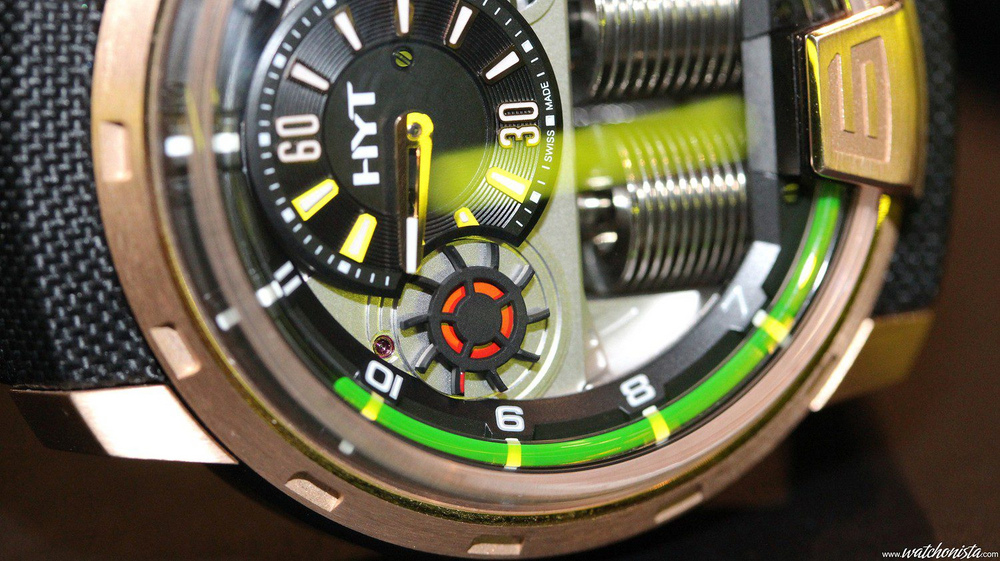
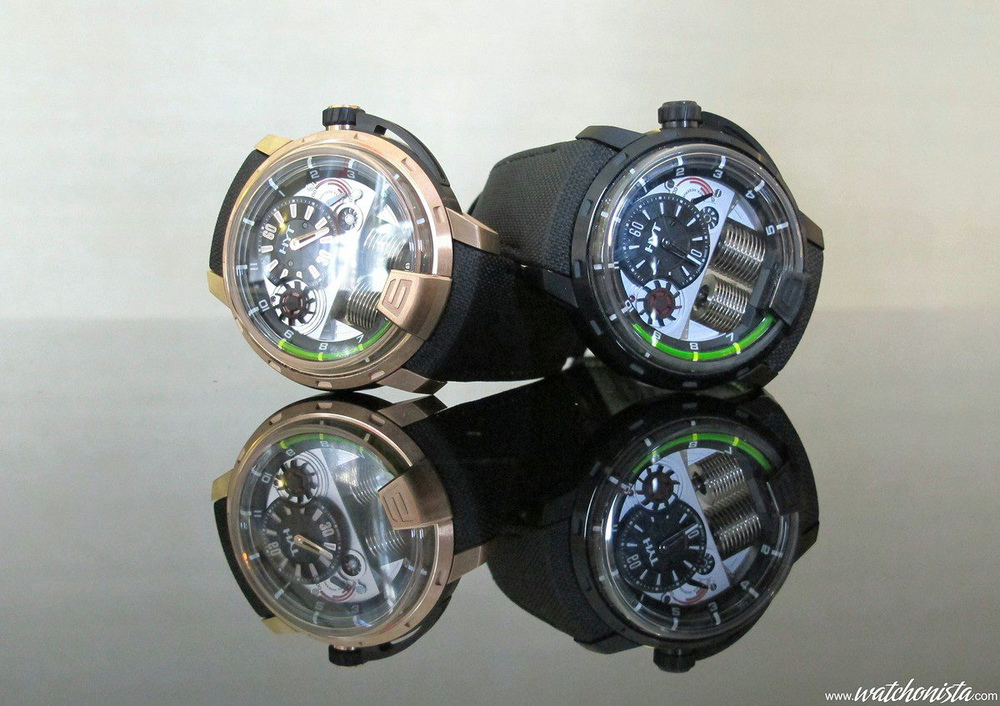
Launching a buzz successfully is like putting a spaceship into orbit, it takes a thruster, but it also takes an astronaut. Yet, most of time the buzz fails, because one of the elements is missing…

The pre-Basel marketing campaign was indeed very well orchestrated: a crew worthy of the A-team, a booth that would fit in Tron Uprising, a most of all, a set with a fancy fluorescent green decoration.
And above all, the engineer with a German accent, who explained how a machine, key to the success of the project, filled the capillaries of the watch. But which watch, by the way?

Regarding the general design, it makes us think of Darth Vader who would have borrowed Flash Gordon's watch.
The HYT H1 is a round watch of about 45mm (actually it is 48.8mm, but it seems far smaller when it sits on the wrist), available with a gold or a titanium case, topped by an impressive raised crystal.
It is rather the contrary of a classic watch, oscillating between sports and science-fiction;
The end result is indeed original and refreshes the round watch style, proof that it is still doable. The feature that makes this piece so special is the couple of rhodium coated pistons which push two fluids, one colorless and the other luminescent green, into capillarie. For that matter, these pistons and the feat they represent in terms of metallurgy are unfortunately outshined by the fluid display system; one would have wished them to be pushed to the forefront.

The luminescent liquid displays a retrograde hour between 7:15 and 5:45. The minutes are indicated on a sub-dial at 12 o'clock, while the power reserve sits at 3 o'clock and the operating indicator at 9 o'clock.
The indexes remind us a bit of some Zenith Defy Extreme from the Nataf period; they contrast in a somewhat anachronistic way with the caliber's magnificent classic finishes, a work performed by the Chronode workshop (located in the Jura led by Jean-François Mojon).

The way the device works is quite simple: the barrels (65-hour power-reserve - 28800v/h) drive the bellows, which move the fluids in the transparent tube.
The most impressive phase is of course when the retrograde indicator goes back to zero: in a few seconds, the transparent fluid pushes the colored one back to its start position.
The most playful amongst us will set the time a little more often than necessary, as this sequence is so impressive.

In terms of design, it is the opposite of the Opus 12: when the latter features a super-complex display, using 27 hands, the HYT could (and should!) almost content itself with its retrograde display; a sector dial with an aperture only for the display would have even more impact.
These two watches are the biggest hits of Baselworld 2012 (with the couple of Tudor)...

If the concept is very simple, as it is the case for any hydraulic technology, the development was a nightmare.
Starting with the watchmaker's psychological barrier of putting a liquid into a watchcase (when, for example, Rolex's core business is the waterproofing). For that matter, it is Preciflex, a company from Bienne, who helped develop a shockproof hydraulic microcircuit, through 7 patents filed by HYT.
Here are some photos of the machine which fills the HYT H1's hydraulic circuit:

Let's be honest, even if the watch is a technological feat, it is also a show-off item: imagine your neighbors on a private beach in St Tropez, green (hydraulic) with envy because they don't own the new kick ass watch…
But the reason why it is such a success in the blogosphere is deeper than these limited views. You all know about the watch-lovers' taste for obsolete technologies?
At the bottom, HYT is a heaven-sent return to the pre-mechanical watchmaking.
Prior to the utilization of wheels, springs and chains, one relied on the flowing of water and its regularity to tell time, even without sunlight. The clepsydra is the mechanical regularity's oldest ancestor.
And even if, in the HYT H1, the liquid is only there for the display, the future developments in hydraulic power applied to watchmaking could give birth to completely new complications, and revive the watchmaking "Haut-Jurassic" era.

Beyond the aspect "Back to the future" and despite the technological feat it represents, the striking feature of this watch is that it does not take itself too seriously... In the everlasting vanity pyre of watchmaking, humor is the salvation received from a fluorescent-green fire hose!!



